

The
Research Project
The
Study Area
Background
Information
Tools
Of The Trade
A
Day In The Life Of . . .
Wednesday, December 5, 2001
“Okyina”
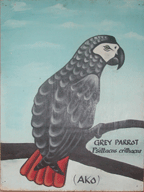 We
are learning that things don’t always go as planned here in Ghana.
“Okyina” means “I will see you tomorrow” in Twi, the
first language of roughly half the population here. It also means “later”.
We are learning to be patient and focus on the moment as so much here
is not in our control and everything takes three times as long to accomplish.
The heat and humidity slow everyone down and the slightest movement results
in torrents of sweat.
We
are learning that things don’t always go as planned here in Ghana.
“Okyina” means “I will see you tomorrow” in Twi, the
first language of roughly half the population here. It also means “later”.
We are learning to be patient and focus on the moment as so much here
is not in our control and everything takes three times as long to accomplish.
The heat and humidity slow everyone down and the slightest movement results
in torrents of sweat.
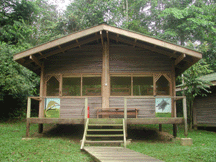 We
arrived at Ankasa tired, sweaty and very dirty late last night. George
and Lindsay led us to our cabins in the dark—there is no electricity
here. The Exploration Base, where the four of us are staying, was recently
built for wildlife education. School children are brought here to learn
about conservation.
We
arrived at Ankasa tired, sweaty and very dirty late last night. George
and Lindsay led us to our cabins in the dark—there is no electricity
here. The Exploration Base, where the four of us are staying, was recently
built for wildlife education. School children are brought here to learn
about conservation.
There are a number of rooms built on stilts connected by wooden pathways.
Each room is 12 X 12 feet with two single cots and nothing else. On the
wall beside each door is a painting of a unique forest animal. These serve
to identify the cabins. Two of the cabin walls are mostly screen, which
makes it seem like we are sleeping outside. All night long we hear a symphony
of nocturnal animals as they announce their presence to the world. Last
night there was a constant chewing noise in one of the corners. We didn’t
get up to look.
The bathrooms are outhouses located down one of the wooden pathways. There
are no toilets—as we know toilets —but instead concrete poured over holes in the floor. Lindsay felt
compelled to tell us about the time she saw a black cobra climb out of
one. These toilets are going to take a bit of getting use to no doubt.
—but instead concrete poured over holes in the floor. Lindsay felt
compelled to tell us about the time she saw a black cobra climb out of
one. These toilets are going to take a bit of getting use to no doubt.
Lindsay and George stay about a kilometer (.6 miles) up the road at the
Nkwanta, the patrol and research base. Lindsay’s room is much like
ours only she sleeps on a mat on the floor. At Nkwanta there is an outside
kitchen with running water. There are showers (only cold water of course)
as water is plentiful here. A solar panel is used to pump well water to
the surface. Here at the camp we can drink the water without boiling or
otherwise purifying it. Elsewhere we buy water sealed in plastic bags
to drink. Drinking water from a bag is an art that needs practice.
There are tame duikers (sounds like “biker”) here at camp. Duikers
are tiny antelope. This morning they were right outside our door and we
could pet them. Duikers have large scent glands on their faces that they
rub up against things to “mark” them. They continually rub their
glands against our hands leaving a very strong odor. Lindsay said 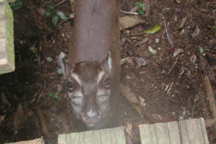 that
whenever she takes the trail behind the camp they follow her into the
forest like dogs would do. Duikers are not usually so tame. The duikers
at Ankasa were confiscated from someone who was keeping them as pets.
The
that
whenever she takes the trail behind the camp they follow her into the
forest like dogs would do. Duikers are not usually so tame. The duikers
at Ankasa were confiscated from someone who was keeping them as pets.
The
Wildlife Department has confiscated many animals like the duikers and
released them in Nkwanta camp where they will be protected. There was
even a tame mona monkey released last year.
This morning was spent getting ourselves organized. With daylight, we
could finally see where we actually are staying. Out of the forest is
cleared a large area for both the Exploration Camp and Nkwanta. The grounds
are kept clear of most trees and other plants. Everything is clean and
tidy. Beyond this however, is a veritable wall of jungle.
When Lindsay left a week ago there was plenty of fuel for the cook stove.
We discovered this morning that the 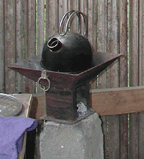 tank
was completely empty. We had to use the charcoal stove to cook our oatmeal
and heat our water for tea and coffee. Getting charcoal to light and then
burn is no small task. The matches are more often wet and don’t light
and then the charcoal has to be fanned until it gets a good burn to it.
This takes time, patience and a strong arm. Sounds like we will have to
cook over charcoal for a few days as there isn’t much fuel in the
area. What there is gets sold over the border in Cote D’Ivoire. George
will go look for some tomorrow.
tank
was completely empty. We had to use the charcoal stove to cook our oatmeal
and heat our water for tea and coffee. Getting charcoal to light and then
burn is no small task. The matches are more often wet and don’t light
and then the charcoal has to be fanned until it gets a good burn to it.
This takes time, patience and a strong arm. Sounds like we will have to
cook over charcoal for a few days as there isn’t much fuel in the
area. What there is gets sold over the border in Cote D’Ivoire. George
will go look for some tomorrow.
No matter what we cook though our meals will be very simple here. Michael
is our de facto chef. He was a safari chef in Kenya for two years so we
have confidence that he can turn rice, bean and the few spices we purchased
at the market into gourmet meals. We bought a few fresh vegetables at
the market yesterday but we will have to eat them within the next few
days as everything rots here so quickly. By this afternoon the tomatoes
had already started “going off”. Occasionally we will drive
out 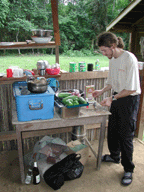 to
get more fresh vegetables but these will be limited, as the local markets
don’t have much. We would have to drive too far to get a variety
of fresh produce. Lindsay says she eats mostly rice with tomato sauce.
Yum! Already we are dreaming of food.
to
get more fresh vegetables but these will be limited, as the local markets
don’t have much. We would have to drive too far to get a variety
of fresh produce. Lindsay says she eats mostly rice with tomato sauce.
Yum! Already we are dreaming of food.
Kevin serves as our resident “everything” expert—from the
constellations we see at night to the soil and geology formations around
us. Because there is no electricity here the night sky is brilliant with
stars. We can see Orion’s belt and sword, Gemini, Pleiades, Cassiopeia,
and so many other constellations.
In camp with us are a number of Wildlife Department personnel. They are
very friendly and animated. When talking to each other they speak in Twi,
their native language and they tend to speak very loudly. To us they seem
to be arguing all the time but they are laughing too much! Plus, Lindsay
assures us that it is just friendly banter.
Bugs, Bugs, Bugs
The bugs here are two types, biting and not biting. Of course, it seems
like there are more of the biting types. Even though it is really hot and we would rather be wearing as little clothing
as possible, we have to wear long pants, socks and heavy shoes to protect
our tender skin from bites. We are determined not to repeat the same mistakes
as in the Amazon last year. These biting flies are tiny but pack a big
and itchy bite!
though it is really hot and we would rather be wearing as little clothing
as possible, we have to wear long pants, socks and heavy shoes to protect
our tender skin from bites. We are determined not to repeat the same mistakes
as in the Amazon last year. These biting flies are tiny but pack a big
and itchy bite!
There are also beautiful butterflies, moths and impressive spiders. Whenever
we walk, the ground erupts in grasshoppers and other grass dwelling bugs.
Perhaps because there are so many bugs, there are also lots of lizards.
They are beautiful and scamper all over the ground. We think they eat
the grasshoppers and bugs.
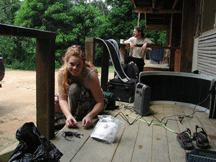 Today
we had to set up the solar panels and the batteries as from here on out
we must rely on solar energy to
Today
we had to set up the solar panels and the batteries as from here on out
we must rely on solar energy to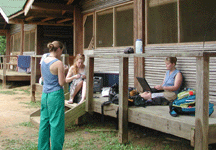 charge our computers and satellite phone. Like the Amazon trip, we have
three solar panels and two super batteries. The wiring on the panels wasn’t
quite to our needs so Shelly had to cut off the end of each wire and rewire
it. She daisy chained two of the panels together and then attached the
cigarette adapter end to the single panel and to the end of the daisy-chained
panels. This way we can plug the batteries directly into the panels for
charging. We also spent time talking with Lindsay about her research here.
We will start posting her data in a day or so. This afternoon we will
be going on our first official monkey survey. We are excited! We are practicing
our silent walking.
charge our computers and satellite phone. Like the Amazon trip, we have
three solar panels and two super batteries. The wiring on the panels wasn’t
quite to our needs so Shelly had to cut off the end of each wire and rewire
it. She daisy chained two of the panels together and then attached the
cigarette adapter end to the single panel and to the end of the daisy-chained
panels. This way we can plug the batteries directly into the panels for
charging. We also spent time talking with Lindsay about her research here.
We will start posting her data in a day or so. This afternoon we will
be going on our first official monkey survey. We are excited! We are practicing
our silent walking.